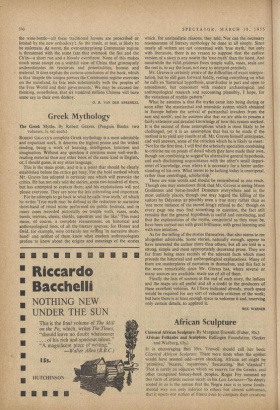China and Communism
The Prospects for Communist China. By W. W. Rostow. (Chap- man and Hail, 40s.) Tuts is less a diagnosis and prognosis, as it claims to be, than a study in wishful thinking, and a dangerous one at that. It has some interest for what it reveals, reading between the lines, about the psychological dilemma that affects much present American thinking on the Far East. But as a guide to the contemporary situation in China it is more likely to fortify prejudice than aid understanding.
The authors explain the plan of the volume as follows : 'Parts 1 and 2 narrate the major facts of modern Chinese history and set out our interpretation of them; Parts 3, 4 and 5 focus inten- sively on the three great strategic factors likely to determine the future evolution of Chinese Communist society—the interplay between the regime and the people, the Sino-Soviet alliance, and the Chinese economy; Part 6 weaves together our conclusions as a whole.' This reads well enough, but performance falls regrettably short of promise. The study comes from the Centre of Interna- tional Studies at the Massachusetts Institute of Technology and is the work of a team. The principal collaborators are Messrs. Hatch, Kiel-man and Eckstein (whose name is incorrectly given on the dust-jacket as Epstein), with Professor Rostow as a kind of non-playing captain—non-playing in the sense that he neither knows China nor claims any special knowledge of the area. Too often 'projects' of this kind suffer from the fact that what is every- body's business is nobody's responsibility. That at least is a charit- able explanation of the poor workmanship that disfigures the book. Chinese names arc frequently misspelt. There arc far too many errors of fact, most of which could have been checked in readily available reference works. There arc also some real bowlers: for instance the Book of Lord Shang (a third-century ac classic of the Legalist school) translated by the late Professor Duyvendak (whose name is also misspelt) is listed in the bibliography under 'Fiction' with Pearl Buck's All Men are Brothers, and Lau She's Rickshaw Boy. Mistakes of this sort are hardly excused by Professor Rostow's disarming claim that 'this is an interpretative essay rather than a scholarly monograph.'
Whether the authors are right or wrong in their interpretation of Communist China's present situation and future prospects must be a matter of opinion, and they arc entitled to their own. In arriving at it they lay great stress on the 'tremendous inertia of Chinese society,' and are even unconvinced that 'Chinese society is theoretically capable of change.' At the same time they see the Communists bending all their efforts to change it, and actually seem a little impressed by what they describe as 'the destructive achievements of the first few Communist years' (referring to the land reform? new industries? currency stabilisation? railway con- struction?). But how arc the Communists setting about their tasks? In answering this question Professor Rostow adopts the view, increasingly fashionable in some quarters, that the present regime is a new incarnation of China's ancient authoritarian Legalism. Chinese Communist rule, he writes, is 'clearly based upon a philosophy which considers men limited, recalcitrant, and possible to socialise only under conditions of strict control.' He is also convinced that 'the Communists are endeavouring to remove from Chinese culture the spirit of Confucianism.' There is a grain of truth in both statements, and both arc misleading (though the Chinese Communists themselves would undoubtedly reject the first outright and as whole-heartedly endorse the second). To characterise the 'thought of Mao Tse-tung' as a refurbished Legal- ism is a simplification that distracts attention from the really important question : the analysis of Chinese Marxism.
Our authors leave us with the impression that the Communist attempt to change Chinese society is another case of the irresistible force meeting the irremovable object—with the betting heavily on the latter. They arc inclined to believe that this vis inertia,. of the masses will in the end defeat all efforts to move them. The pressure of the ruling elite will first annoy, and eventually provoke, the people into non-co-operation (or even into an explosion; for, as the text quaintly puts it : 'the large family, the study of the classics,
the wine-bottle--all these traditional havens are proscribed or limited by the new orthodoxy'). So the result, at best, is likely to be stalemate. At worst, the over-enterprising Communist regime is threatened with the same fate that overtook the Sui and the Ch'in—a short run and a bloody overthrow. None of this makes much sense except on a wishful view of China that grotesquely underestimates its resources and potentialities, human and material. It does explain the curious conclusion of the book, which is that 'despite the unique powers the Communist regime exercises on the mainland, its fate rests substantially with the peoples of the Free World and their governments.' We may be excused for thinking, nonetheless, that six huddred million Chinese will have some say in their own destiny.
0. B. VAN DER SPRENKEL











































 Previous page
Previous page